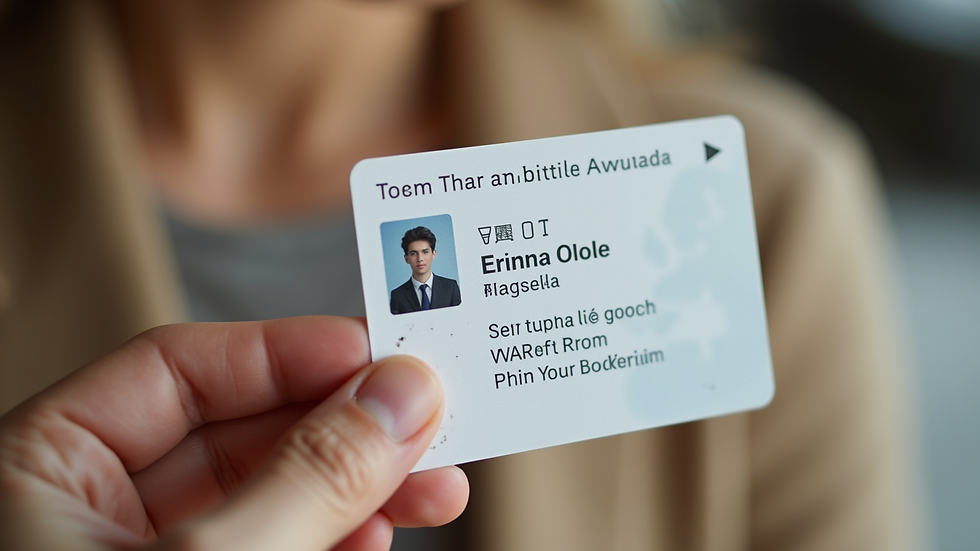Community Engagement: Sunflower Symbol on State IDs for Awareness
- Cyndi Bricknell
- Jul 11
- 4 min read
In recent years, the sunflower has emerged as a powerful symbol of hope and awareness. This vibrant flower, known for its bright yellow petals and ability to turn towards the sun, has found its way into various initiatives aimed at raising awareness for important causes. One of the most impactful uses of the sunflower symbol is its incorporation into state IDs, which serves as a reminder of the importance of community engagement and support for those affected by various challenges.
This blog post will explore the significance of the sunflower symbol on state IDs, its role in community engagement, and how it can foster awareness and support for individuals facing mental health issues, disabilities, and other challenges.
The Significance of the Sunflower Symbol
The sunflower is more than just a beautiful flower. It represents positivity, resilience, and the ability to thrive even in difficult conditions. This symbolism resonates deeply with many individuals and communities.
When the sunflower is used on state IDs, it serves as a visual reminder of the importance of compassion and understanding. It encourages people to look beyond the surface and recognize the struggles that others may be facing.
By incorporating the sunflower into state IDs, states can promote a culture of awareness and support. This simple yet powerful symbol can spark conversations and encourage individuals to engage with one another in meaningful ways.
Community Engagement Through Awareness
Community engagement is essential for building strong, supportive environments. When individuals come together to raise awareness about important issues, they create a sense of belonging and connection.
The sunflower symbol on state IDs can play a crucial role in this process. Here are a few ways it can enhance community engagement:
Encouraging Conversations: The sunflower can serve as a conversation starter. When people see the symbol on someone’s ID, it can prompt discussions about mental health, disabilities, or other challenges. This can lead to greater understanding and empathy within the community.
Promoting Events: States can organize events centered around the sunflower symbol. These events can include workshops, support groups, or awareness campaigns. By bringing people together, communities can foster a sense of unity and support.
Creating Resources: The sunflower symbol can be used to identify resources available for individuals facing challenges. For example, local organizations can use the symbol to mark safe spaces or support services. This makes it easier for individuals to find help when they need it.
Real-Life Examples of Sunflower Initiatives
Several states have already begun to incorporate the sunflower symbol into their initiatives. Here are a few notable examples:
1. California's Mental Health Awareness Program
In California, the sunflower symbol has been adopted as part of a mental health awareness program. The state has included the sunflower on driver’s licenses and state IDs to promote conversations about mental health.
This initiative has led to increased awareness and understanding of mental health issues. It has also encouraged individuals to seek help and support when needed.
2. Florida's Disability Awareness Campaign
Florida has launched a campaign that uses the sunflower symbol to raise awareness about disabilities. The state has partnered with local organizations to provide resources and support for individuals with disabilities.
By using the sunflower on state IDs, Florida aims to create a more inclusive environment. This initiative has helped to break down barriers and promote understanding within the community.
3. Texas's Community Support Events
Texas has organized community support events that feature the sunflower symbol. These events focus on mental health, disabilities, and other challenges.
By bringing people together, Texas aims to foster a sense of community and support. The sunflower serves as a reminder of the importance of compassion and understanding.
How to Get Involved
If you are interested in supporting the sunflower initiative in your state, there are several ways to get involved:
Advocate for Change: Reach out to your local representatives and advocate for the inclusion of the sunflower symbol on state IDs. Share your thoughts on the importance of awareness and community engagement.
Participate in Events: Attend local events that focus on mental health, disabilities, or other challenges. Your participation can help raise awareness and support for those in need.
Spread the Word: Use social media to share information about the sunflower symbol and its significance. Encourage your friends and family to learn more about the initiative and get involved.
The Power of Community Support
Community support is vital for individuals facing challenges. When people come together to raise awareness and provide support, they create a network of compassion and understanding.
The sunflower symbol on state IDs serves as a reminder of this power. It encourages individuals to engage with one another and foster a sense of belonging.
By promoting awareness and understanding, communities can create environments where everyone feels valued and supported.
A Bright Future with the Sunflower
As more states adopt the sunflower symbol on their IDs, the potential for community engagement and awareness continues to grow. This simple yet powerful symbol can spark conversations, promote understanding, and foster a sense of unity.
The sunflower represents hope, resilience, and the importance of supporting one another. By embracing this symbol, communities can work together to create a brighter future for all.

In a world where challenges can often feel overwhelming, the sunflower serves as a beacon of light. It reminds us that we are not alone and that together, we can make a difference.
Let us embrace the sunflower symbol and work towards a future where awareness and community support are at the forefront of our efforts. Together, we can create a world where everyone feels seen, heard, and valued.


Comments